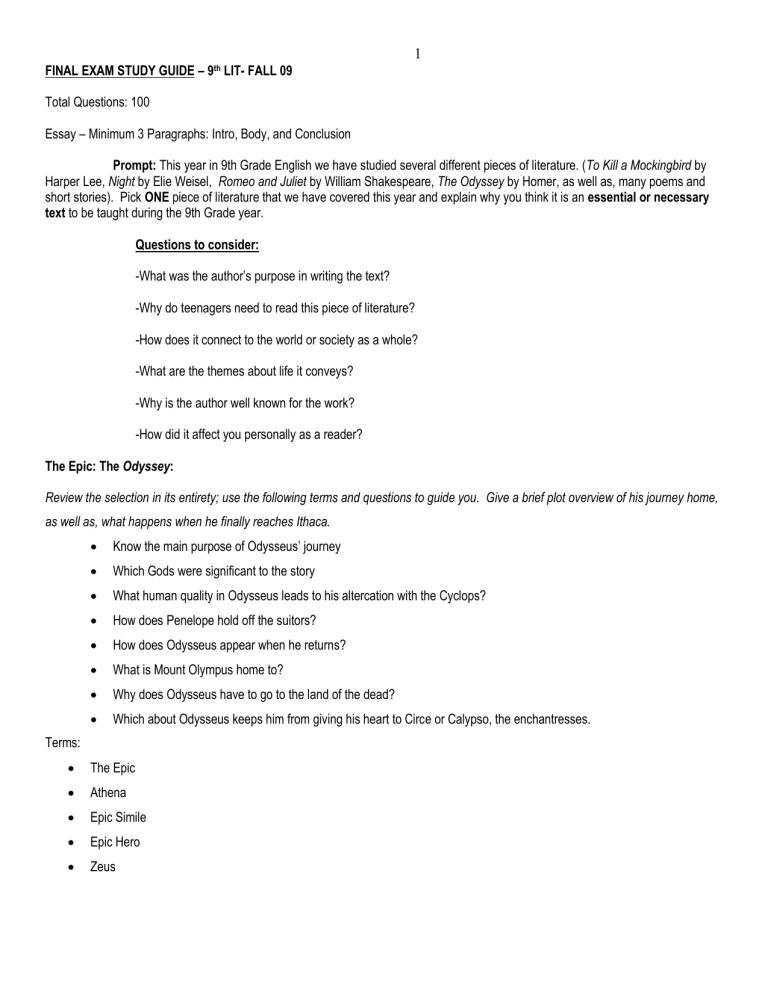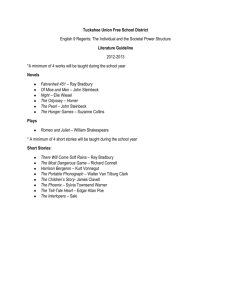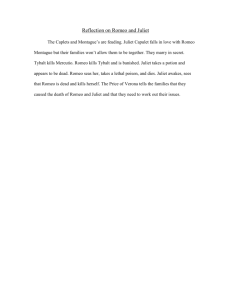FINAL EXAM STUDY GUIDE – 9TH GRADE LITERATURE AND
advertisement

1 FINAL EXAM STUDY GUIDE – 9th LIT- FALL 09 Total Questions: 100 Essay – Minimum 3 Paragraphs: Intro, Body, and Conclusion Prompt: This year in 9th Grade English we have studied several different pieces of literature. (To Kill a Mockingbird by Harper Lee, Night by Elie Weisel, Romeo and Juliet by William Shakespeare, The Odyssey by Homer, as well as, many poems and short stories). Pick ONE piece of literature that we have covered this year and explain why you think it is an essential or necessary text to be taught during the 9th Grade year. Questions to consider: -What was the author’s purpose in writing the text? -Why do teenagers need to read this piece of literature? -How does it connect to the world or society as a whole? -What are the themes about life it conveys? -Why is the author well known for the work? -How did it affect you personally as a reader? The Epic: The Odyssey: Review the selection in its entirety; use the following terms and questions to guide you. Give a brief plot overview of his journey home, as well as, what happens when he finally reaches Ithaca. Know the main purpose of Odysseus’ journey Which Gods were significant to the story What human quality in Odysseus leads to his altercation with the Cyclops? How does Penelope hold off the suitors? How does Odysseus appear when he returns? What is Mount Olympus home to? Why does Odysseus have to go to the land of the dead? Which about Odysseus keeps him from giving his heart to Circe or Calypso, the enchantresses. Terms: The Epic Athena Epic Simile Epic Hero Zeus 2 Poetry Unit Review the unit in its entirety; use the following terms and questions to guide you. (Give a brief overview of each of the following poems: The Bells, Dreams, Dream Deferred, The Road Not Taken, Three Haiku and Hokku Poems, Summer, The Eagle, I Hear America Singing, Jabberwocky, Sonnet 30, On the Grasshopper and the Cricket)) Terms: Alliteration Repetition Assonance Stanza Sonnet Free Verse Blank Verse Onomatopoeia Narrative Poem Hyperbole What is the subject of most Haikus? What are the diverging roads a symbol for in “The Road Not Taken”? “Bugs buzzin from cousin to cousin” – what is the sound device used? “Peter piper picked a pair of pickled peppers” – what is the sound device used? Short Story Unit Review the unit in its entirety; use the following terms and questions to guide you. (Give a brief plot overview of each of the following stories: The Cask of Amontillado, The Interlopers, The Gift of the Magi, The Necklace, The Most Dangerous Game,) Terms: Protagonist Antagonist Characterization Dramatic Irony Personification Plot Allusion Metaphor Know the plot diagram – draw here Who are the two main characters in “The Most Dangerous Game”? What is the setting of “The Cask of Amontillado”? How does the fable, “The Golden Kite, the Silver Wind” teach a lesson to its readers? In “The Gift of the Magi”, how are Della and Jim’s gifts like that of the Magi? The main lesson of “The Interlopers” concerns the…? What is the primary conflict in “The Most Dangerous Game” What type of society would Madame Loisel from “The Necklace” value most? Theme 3 Drama – Romeo and Juliet Review the selection in its entirety; use the following terms and questions to guide you. Terms: Monologue Soliloquy Drama Aside Dramatic Foil Questions: To what object does Romeo compare Juliet at the beginning of the balcony scene? Why does the Friar agree to the request for marriage between Romeo and Juliet? What contrasting traits do Benvolio and Tybalt have? Romeo is motivated to kill Tybalt because Tybalt has…done what? What does Romeo buy from the apothecary? What is Juliet’s reaction to seeing Romeo dead? Literature – To Kill a Mockingbird Review the novel in its entirety; use the following terms and questions to guide you. Terms: Dialogue Symbolism Internal Conflict External Conflict Flat Character Round Character Foreshadowing Point of View Static Character Dynamic Character Setting Metaphor Suspense Irony What does Scout dress up as to go to the pageant? Why do you think Atticus never uses a gun unless necessary? What does Scout see as she stands on Boo’s porch at the end of the novel? What are the main themes of TKAM? What is the mockingbird a symbol for in the novel? What is Maycomb’s “usual disease”? Who wrote TKAM? 4 Who said that “You never really know a person until you climbinto their skin and climb around in it”? RESEARCH True or False: If you don’t have an author’s last name to use when alphabetizing your sources, you should use the first letter of the next piece of information that you do have. True or False: Your Works Cited page and the documentation in the research paper should match. Plagiarism can be avoided by: a. Including a proper Works Cited page b. Including proper documentation in the paper c. Paraphrasing or quoting the info. from a secondary source d. All of the above Literature, Nonfiction – Night Review the novel in its entirety; use the following terms and questions to guide you. Terms: Biography Author’s Purpose Autobiography Elie Wiesel Memoir Questions: What is Elie’s main interest at the beginning of the story? What are the main themes of this memoir? Why did the Sighet Jews underestimate the approaching danger? What were the last words Elie heard when he was separated from his mother and sister? What was Elie’s main purpose in writing the memoir? (we talked about this when we were writing the research paper on Elie Wiesel)






